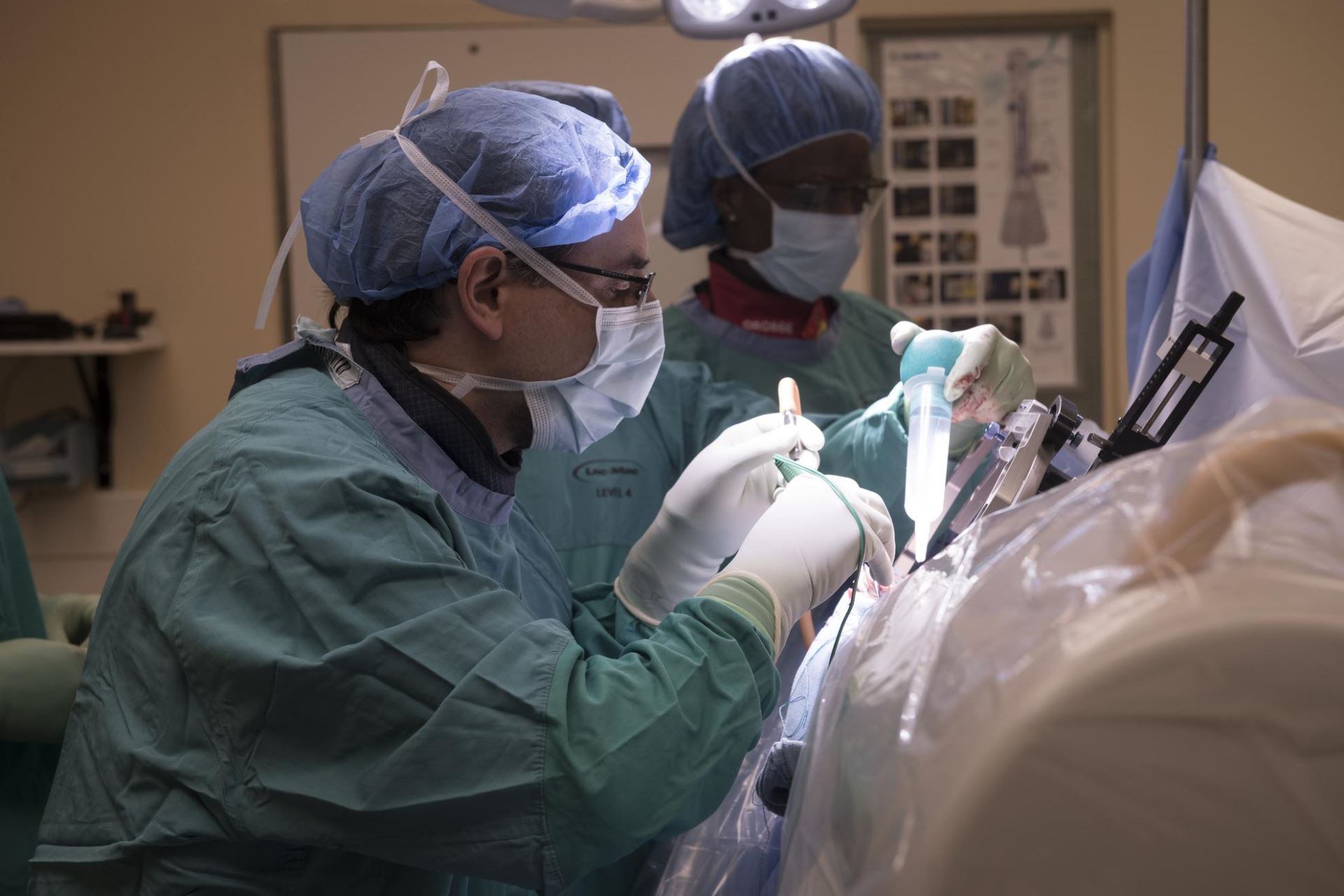Deep brain stimulation (DBS) shown to be safe in treating post-traumatic stress disorder
Researchers also show improvement in physiological marker after DBS.
In a Canadian-first, Sunnybrook researchers have provided early evidence that deep brain stimulation (DBS), a type of brain surgery, is safe and potentially effective in treating severe and treatment-resistant post-traumatic stress disorder (PTSD).
Researchers also found a promising biomarker which may be a future indicator of an individual’s response to DBS.
The groundbreaking research has been published in Science Advances.
PTSD is a debilitating illness that impacts the lives of more than 3 million Canadians. It can occur in individuals who have experienced traumatic events including war, violence, accidents or abuse. Patients may suffer from distressing or frightening thoughts, flashbacks, or nightmares, which can be long term and significantly impact quality of life.
Results from this phase I clinical trial suggest that DBS can improve symptoms in patients with PTSD. Six months after surgery, three out of four patients in the pilot study saw improvement in their symptoms, and were able to better manage their fear response as measured by the Clinician-Administered PTSD Scale (CAPS), a structured interview that is considered the gold standard in assessing symptoms of PTSD. Patients’ scales on average dropped 55 percent.
“Approximately 20-30 percent of patients diagnosed with PTSD do not respond to conventional treatments such as psychotherapy and medication, which is known as treatment-resistant PTSD,” says Dr. Nir Lipsman, principal investigator and director at Sunnybrook’s Harquail Centre for Neuromodulation. “Although this research is still in its early stages, these preliminary results are encouraging, suggesting DBS could be a breakthrough approach in managing treatment-resistant PTSD.”
DBS is a neurosurgical procedure that directly targets dysfunctioning brain circuits. It involves inserting thin electrodes into deep brain structures that are responsible for associated symptoms and electrically stimulating them with a pacemaker-like device, which is implanted in the chest. DBS is already an established therapy for movement disorders, such as Parkinson’s, essential tremor and obsessive-compulsive disorder.
In the study, researchers used the direct-to-brain approach to target the subgenual cingulum and uncinate fasciculus, areas of the brain known to play a role in PTSD and previously validated as successful targets in preclinical research pioneered by Sunnybrook scientists.
In addition to clinical assessments and neuroimaging, patients in the study also completed psycho-physiological assessments of fear conditioning and extinction, measuring their sweat response to stressful stimuli in both threatening and non-threatening contexts, before and after DBS.
The researchers found those who had the highest capacity to disassociate fear response from stimuli over time, were more likely to have a better clinical outcome, suggesting that in the future, this assessment could be a useful biomarker in predicting who may respond best to surgery.
“Post-DBS, some patients showed an improvement in response and did not have increased sweating, signaling feelings of fear. It is still early in the research, and more investigation with a larger sample size is needed, but we’re very encouraged by these first-in-the-world study findings,” explains Dr. Clement Hamani, principal investigator, senior scientist and research director of the Hurvitz Brain Sciences Research Program at Sunnybrook Research institute. “After many years of preclinical research, these results represent a significant step forward in our mission to find more precise treatments for PTSD and help improve quality of life for patients and their family members.”
Generous philanthropic investment in Sunnybrook’s Harquail Centre for Neuromodulation, including lead support from the Harquail Family, is a catalyst for advancing this study and other groundbreaking neuromodulation work at Sunnybrook. Clinical aspects of the trial were supported by the DANA foundation. In 2018, Sunnybrook researchers received a $1.25 million funding grant through the Government of Canada’s Veteran and Family Well-Being Fund to investigate innovative treatments for PTSD and support the first dedicated neuromodulation program for PTSD in Canada at the Harquail Centre for Neuromodulation.
Patient view: How deep brain stimulation changed Sarah’s life
For more information about deep brain stimulation at Sunnybrook: sunnybrook.ca/dbs
Learn more about the Harquail Centre for Neuromodulation at Sunnybrook
Media Contacts:
Samantha Sexton
Communications Manager
Sunnybrook Research Institute
samantha.sexton@sunnybrook.ca
Jennifer Palisoc
Communications Advisor
Sunnybrook Health Sciences Centre
jennifer.palisoc@sunnybrook.ca






